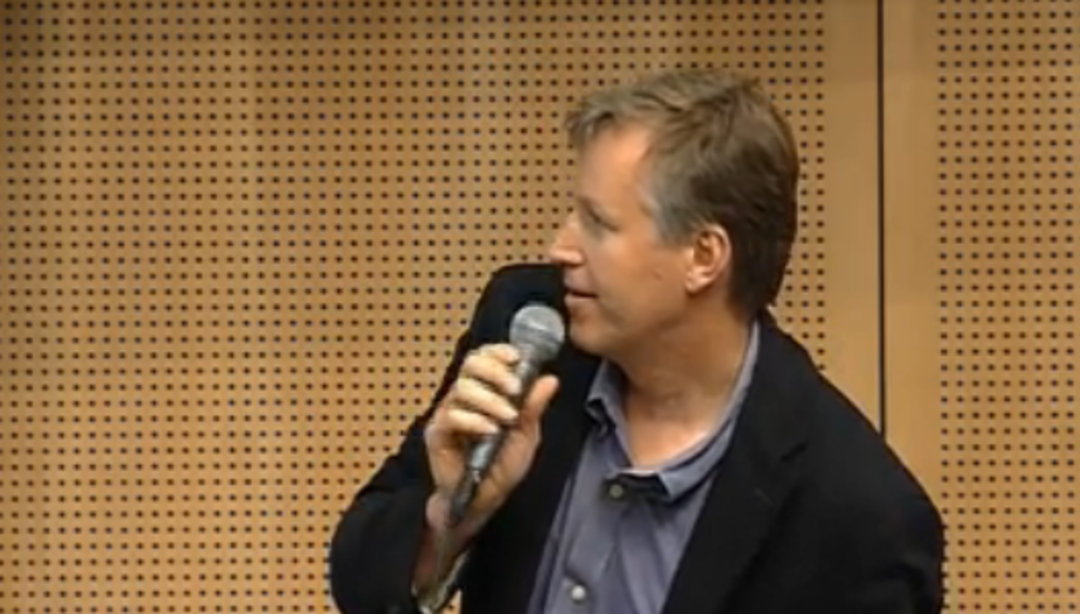Agree or Disagree with O'Brien's Stance on Global Trade, the Council Is Relevant Again

Caffeinated News
It's hard to place Seattle city council member Mike O'Brien's politics these days. On the one hand, his Sierra Club urbanism—leading on transit as an eloquent member of the Sound Transit board and, last night, on pedestrian zones—is exactly what the city needs. Meanwhile, his neighborhood populism on linkage fees and aPodments seems confused at best and like election-year pandering at worst. Recently he found the sweet spot between his Al Gore base and his newfound Elizabeth Warren worldview when he opposed a $500,000 Vulcan giveaway for a supposedly public, but likely corporate, park—outflanking the urbanists at their own game by being one step ahead on green planning. "The neighborhood plan called for housing not corporate blockfaces." I'm not sure if his canny combination of populism and urbanism was intentional.
The sign-in log at the city council's second-floor offices this week show that Boeing, Starbucks, and Microsoft have all been in to lobby council members (only
those up for reelection)
in the runup to next Monday's TPP vote.
And now we have his complaints with the Trans-Pacific Partnership—the 12-country, Pacific Rim trade deal (like NAFTA, but for the U.S., Australia, Brunei, Canada, Chile, Japan, Malaysia, Mexico, New Zealand, Peru, Singapore, and Vietnam). Recalling both the legit and Luddite concerns of the anti-WTO left and right, O'Brien has raised longstanding criticisms with international trade deals: They can instigate race-to-the-bottom economics that undercut local control (will Seattle's recent $15 minimum wage standard be at risk?), and they're crafted behind closed doors.
Personally, I've always thought international trade agreements between governments were a good start at checking transnational corporations' own globalist aims with concomitant global government oversight. The catch of course, is that the governments need to govern not cater. But in the end, by way of analogy, I'd certainly rather have the EPA in place than not, even if Exxon is currently holding court.
I will say: The Seattle Times's paternalistic editorial telling O'Brien and the council not worry their pretty little heads about a complex trade agreement and focus instead on downtown crime, is more unintelligible than anything O'Brien is up to. How does passing a resolution about the terms of a trade agreement—"the Seattle City Council opposes 'fast track' authority for the TPP and instead requests that the president and congress carry out a fully transparent and inclusive legislative process for consideration of the TPP"—prevent O'Brien and his colleagues from also addressing traditional municipal issues?
Again: Just last night, O'Brien held a 5:30 public meeting at city hall about a picayune Department of Planning and Development plan to activate business districts in 39 spots all over the city. How much more hyperlocal (and proactive in the fight against crime) can you get than "requir[ing] overhead weather protection for new development along a principal pedestrian street"—one of the nerdy bullet-point planning recommendations in DPD's pedestrian-friendly Jane Jacobs plan to put eyes on the street?

The sign-in log at the city council's second floor offices this week show that Boeing, Starbucks, and Microsoft have all been in to lobby council members (only those up for reelection) in the runup to next Monday's vote on O'Brien's TPP resolution. The visits also show that, if anything, as federal and state gridlock calcifies public policy, and as metro regions emerge as keystones of international economics, the council is more relevant both locally and globally than they've been in years.
O'Brien's opinions about global trade agreements (and Shell Oil at the port) are perfectly legit in the global dialogue. As is the City of Seattle.
The Seattle Times cites Washington state's impressive trade stats as a reason that O'Brien should pipe down. But O'Brien cites the same economic clout as a reason to weigh in. When it comes to understanding what it means to be a world-class city, or at least relevant, O'Brien is far ahead of the Times.




